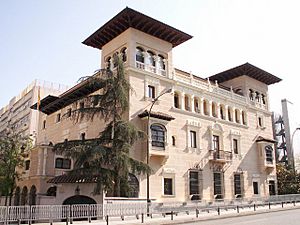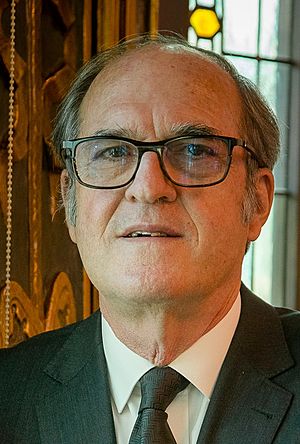Spanish Ombudsman facts for kids
Quick facts for kids Spanish Ombudsman |
|
|---|---|

|
|
| Style | The Most Excellent (formal) Mr. Ombudsman (informal) |
| Nominator | Cortes Generales |
| Appointer | Speaker of the Congress Speaker of the Senate |
| Term length | 5 years |
| Constituting instrument | Spanish Constitution |
| Formation | 1981 |
| First holder | Joaquín Ruiz-Giménez Cortés |
| Deputy | First Deputy Ombudsman |
| Salary | € 119,755.23 per year |
| Website | https://www.defensordelpueblo.es/en/ |
The Spanish Ombudsman (also called the Defender of the People) is a special person in Spain. Their job is to protect the basic rights and freedoms of everyone. They do this by checking on what the government and public services do.
This important role was created by the Spanish Constitution in 1978. A special law in 1981 explained how the Ombudsman should work. The Ombudsman and their two helpers (called Deputy Ombudsmen) are chosen by both parts of the Spanish Parliament: the Congress of Deputies and the Senate of Spain. A special group picks the candidates, and then Parliament votes.
To become the Ombudsman, a person must be a Spanish citizen and an adult. They must also have all their civil and political rights. The Ombudsman serves for five years. They stop being Ombudsman if they resign, their time is up, they pass away, or become unable to do the job. They also stop if they don't do their job well or are found guilty of a serious crime. If the job is empty, the First Deputy Ombudsman takes over temporarily.
Contents
What the Ombudsman Can Do
The Ombudsman works independently. This means they don't take orders from anyone in the government. They make their own decisions about how to do their job.
Protection for the Ombudsman
The Ombudsman has special protection. They cannot be arrested or punished for what they say or do while working. In other cases, they can only be arrested if caught doing something wrong. Any serious legal action against them must be handled by the Supreme Court of Spain. These rules also apply to the Deputy Ombudsmen when they are doing their work.
Other Jobs the Ombudsman Cannot Have
The Ombudsman cannot have any other jobs that might stop them from being fair. This means they cannot be a politician, work for the government in another role, or be part of a political party or union. They also cannot work in law or do any other private business. If they have any of these jobs when they are chosen, they must quit them within ten days. If they get another job like this after starting, they must resign as Ombudsman.
The Ombudsman's Team
The Ombudsman has two main helpers: a First Deputy and a Second Deputy Ombudsman. These deputies can take over the Ombudsman's duties if needed. They also step in if the Ombudsman is temporarily unable to work or leaves the job. The Ombudsman chooses their deputies, but the Spanish Parliament must approve them.
The Ombudsman can also hire other advisors to help with their work. These advisors are considered to be working for the Parliament. When a new Ombudsman starts, the deputies and advisors from the previous Ombudsman's team automatically leave their jobs. The deputies have the same protections and rules about other jobs as the Ombudsman. They also need to meet the same requirements to be chosen.

Where the Ombudsman Works
The Ombudsman makes sure that human rights are respected by all levels of government in Spain. This includes the national government, regional governments, and local town councils. They can start investigations on their own or when someone complains to them.
If a complaint is about the justice system (like courts), the Ombudsman usually sends it to the Public Prosecutor's Office or the General Council of the Judiciary. This is so the right people can investigate. The Ombudsman also checks on human rights in the military, but they don't interfere with military command.
Working with Regional Ombudsmen
Over time, many regions in Spain created their own Ombudsmen. A law in 1985 helped explain how these regional Ombudsmen work with the national Spanish Ombudsman. They often work together to protect rights and freedoms. If a problem comes from the national government acting in a region, the national Ombudsman usually takes the lead. However, they can ask the regional Ombudsman for help to solve the problem better. They also share their findings with the regional office.
List of Spanish Ombudsmen
- Status
This color means the person was a temporary (acting) Ombudsman.
| No. | Portrait | Name | Started Job | Left Job |
|---|---|---|---|---|
| 1º |  |
Joaquín Ruiz-Giménez (1913–2009) |
30 December 1982 | 30 December 1987 |
| - |  |
Álvaro Gil-Robles Acting Ombudsman (1944–) |
30 December 1987 | 16 March 1988 |
| 2º |  |
Álvaro Gil-Robles (1944–) |
16 March 1988 | 16 March 1993 |
| - |  |
Margarita Retuerto Buades Acting Ombudsman (1944–2005) |
16 March 1993 | 1 December 1994 |
| 3º |  |
Fernando Álvarez de Miranda (1924–2016) |
1 December 1994 | 1 December 1999 |
| - |  |
Antonio Rovira Viñas Acting Ombudsman (1952–) |
1 December 1999 | 15 June 2000 |
| 4º |  |
Enrique Múgica Herzog (1924–2020) |
15 June 2000 | 30 June 2010 |
| - |  |
María Luisa Cava de Llano Acting Ombudsman (1948–) |
30 June 2010 | 21 July 2012 |
| 5º |  |
Soledad Becerril Ombudsman (1948–) |
21 July 2012 | 21 July 2017 |
| - |  |
Francisco Fernández Marugán Acting Ombudsman (1946–) |
21 July 2017 | 18 November 2021 |
| 6º |  |
Ángel Gabilondo Ombudsman (1949–) |
18 November 2021 | Incumbent |
See also
 In Spanish: Defensor del Pueblo (España) para niños
In Spanish: Defensor del Pueblo (España) para niños
 | Precious Adams |
 | Lauren Anderson |
 | Janet Collins |


